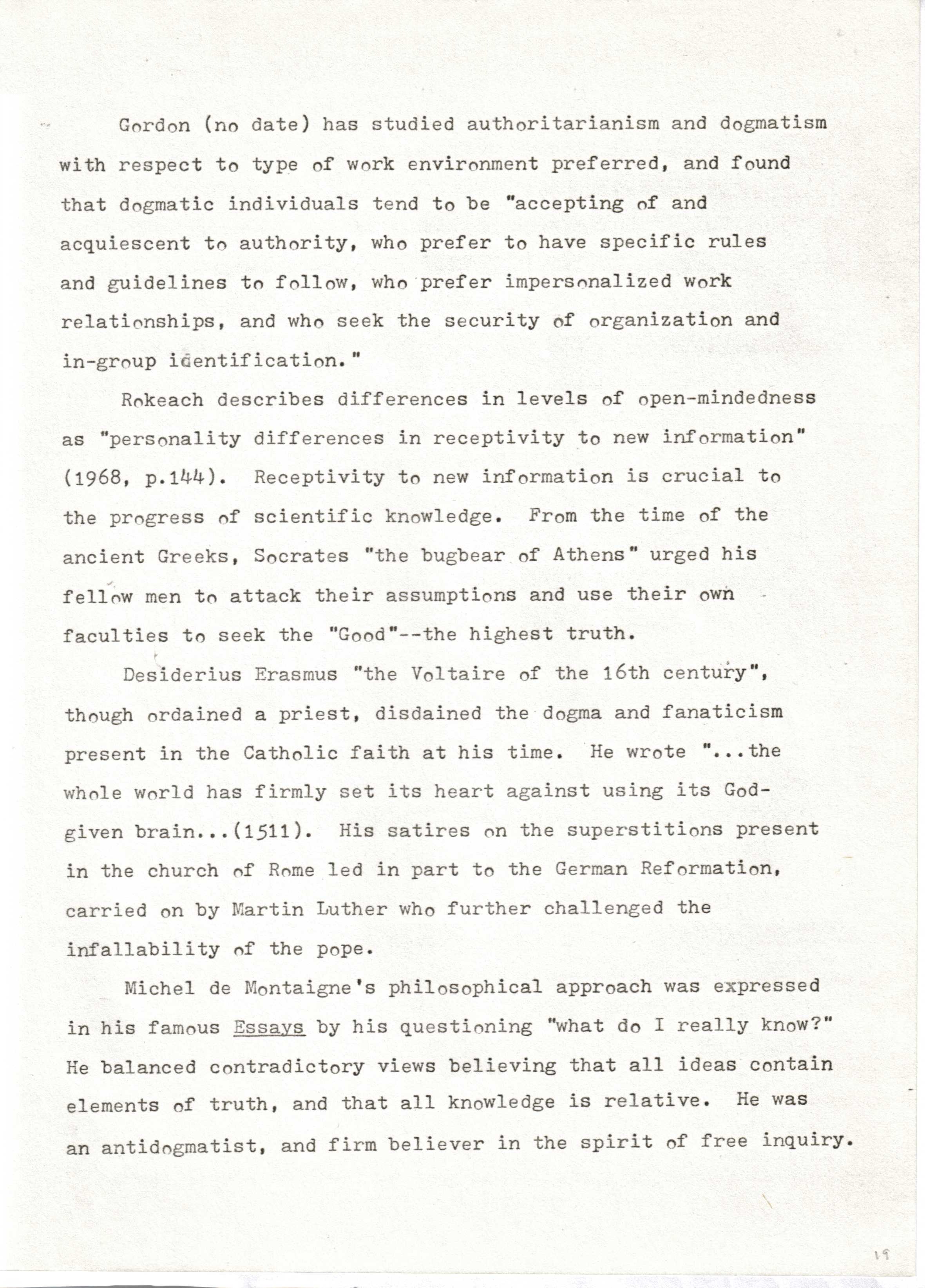
ctomeegmiu19.jpg
|
Gordon (no date) has studied
authoritarianism and dogmatism
with respect to type of work environment
preferred, and found
that dogmatic individuals tend to be
”accepting of and
acquiescent to authority, who prefer to
have specific rules
and guidelines to follow, who prefer
impersonalized work
relationships, and who seek the security of organization and
in-group identification.”
Rokeach describes differences in levels of
open-mindedness
as ”personality differences in receptivity
to new information"
(1968, p.144). Receptivity to new
information is crucial to
the progress of scientific knowledge. From
the time of the
ancient Greeks, Socrates "the bugbear of
Athena" urged his
fellow men to attack their assumptions and
use their own
faculties to seek the "Good'—-the highest truth.
Desiderius Erasmus “the Voltaire of the
16th century”,
though ordained a priest, disdained the
dogma and fanaticism
present in the Catholic faith at his time.
He wrote "...the whole world has firmly set its heart against using its
God-given brain" (1511). His satires on the
superstitions presenting the church of Rome led in part to the
German Reformation,
carried on by Martin Luther who further
challenged the
infallibility of the pope.
Michel de Montaigne‘s philosophical
approach was expressed
in his famous Essays by his questioning
”what do I really know?"
He balanced contradictory views believing
that all ideas contain
elements of truth, and that all knowledge
is relative. He was
an antidogmatist, and firm believer in the
spirit of free inquiry. |
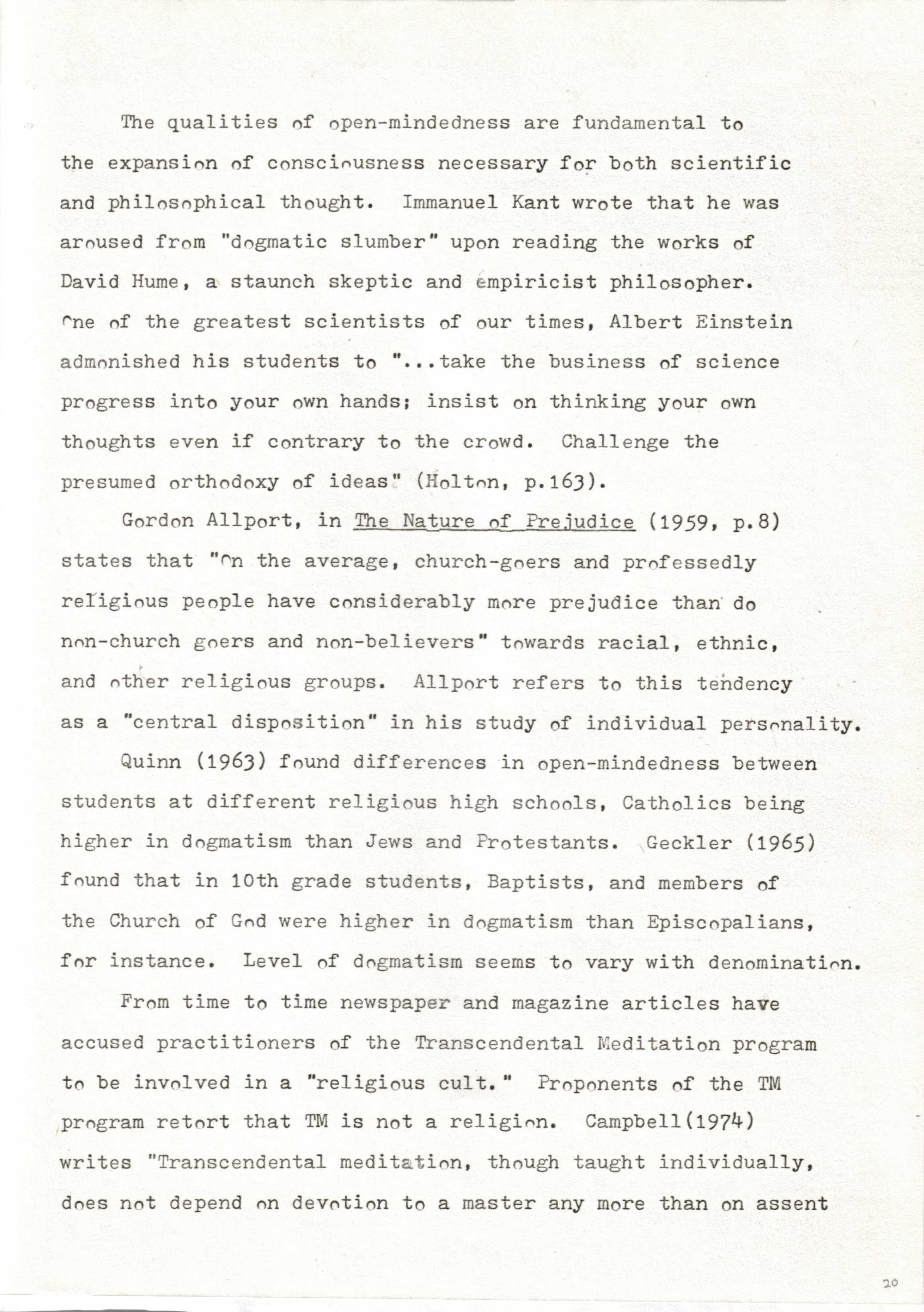
ctomeegmiu20.jpg
|
The qualities of open-mindedness are
fundamental to
the expansion of consciousness necessary
for both scientific
and philosophical thought. Immanuel Kant
wrote that he was
aroused from “dogmatic slumber“ upon
reading the works of
David Hume, a staunch skeptic and
empiricist philosopher.
One of the greatest scientists of our
times, Albert Einstein
admonished his students to “...take the
business of science
progress into your own hands; insist on
thinking Your own
thoughts even if contrary to the crowd.
Challenge the
presumed orthodoxy of ideas? (Holton,
p.163).
Gordon Allport, in The Nature of Prejudice
(1959, p.8)
states that "On the average, church-goers
and professedly
religious people have considerably more prejudice than do
non-church goers and non-believers" towards
racial, ethnic,
and other religious groups. Allport refers
to this tendency
as a "central disposition" in his study of
individual personality.
Quinn (1963) found differences in
open—mindedness between
students at different religious high
schools, Catholics being
higher in dogmatism than Jews and
Protestants. Geckler (1965)
found that in 10th grade students,
Baptists, and members of
the Church of God were higher in dogmatism
than Episcopalians,
for instance. Level of dogmatism seems to
vary with denomination.
From time to time newspaper and magazine
articles have
accused practitioners of the Transcendental
Meditation program
to be involved in a ”religious cult.'
Proponents of the TM
program retort that TM is not a religion. Campbell(1974)
writes "Transcendental meditation, though
taught individually,
does not depend on devotion to a master any
more than on assent
|
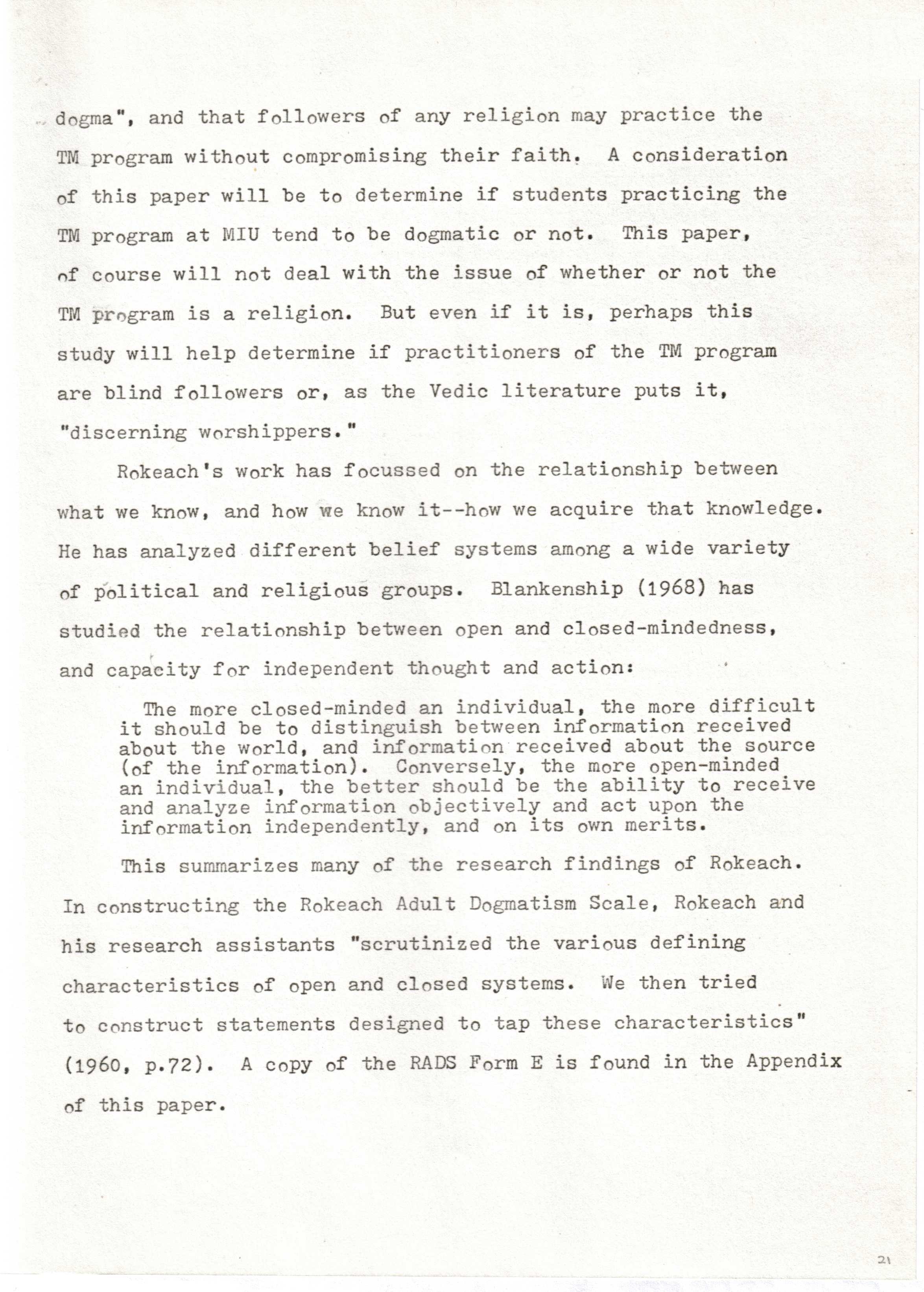
ctomeegmiu21.jpg
|
dogma", and that followers of any religion
may practice the
TM program without compromising their
faith. A consideration
of this paper will be to determine if
students practicing the
TM program at MIU tend to be dogmatic or
not. This paper,
of course will not deal with-the issue of
whether or not the
TM program is a religion. But even if it
is, perhaps this study will help determine if practitioners
of the TM program
are blind followers or, as the Vedic
literature puts it,
“discerning worshippers.”Rokeach's work has focused on the
relationship between
what we know, and how we know it--how we
acquire that knowledge.
He has analyzed different belief systems
among a wide variety
I of political and religious groups.
Blankenship (1968) has
studied the relationship between open and
closed—mindedness,
and capacity for independent thought and
action: "
- The more closed--minded an individual, the
more difficult
it should be to distinguish between
information received
about the world, and information received
about the source
(of the information). Conversely, the more
open-minded
an individual, the better should be the
ability to receive
and analyze information objectively and act
upon the
information independently, and on its own
merits.
This summarizes many of the research
findings of Rokeach.
In constructing the Rokeach Adult Dogmatism
Scale, Rokeach and
his research assistants "scrutinized the
various defining
characteristics of open and closed systems.
We then tried
to construct statements designed to tap
these characteristics"
(1960, p.72). A copy of the RADS Form E is
found in the Appendix
of this paper. |
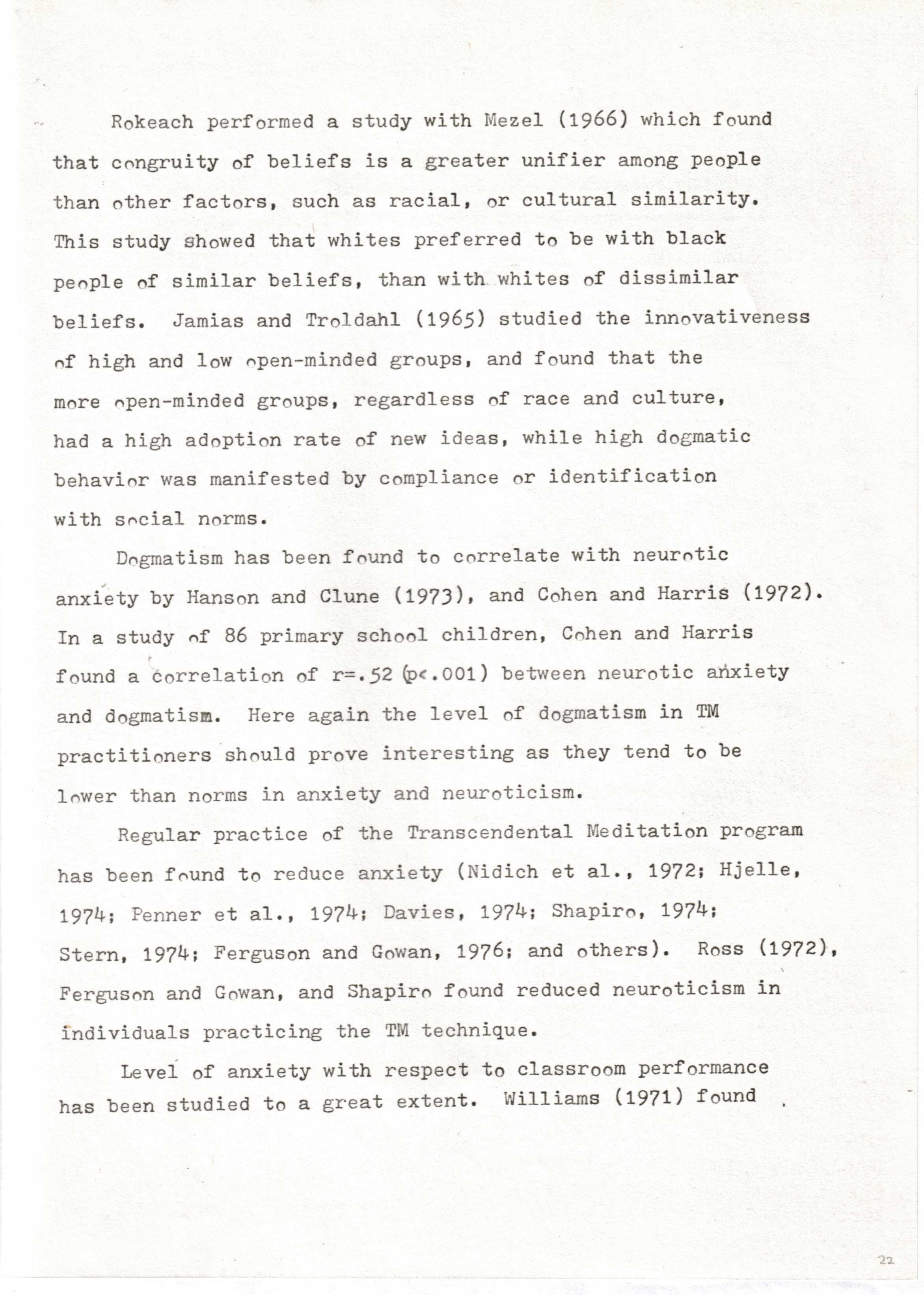
ctomeegmiu22.jpg
|
Rokeach performed a study with Mezel (1966)
which found
that congruity of beliefs is a greater
unifier among people
than other factors, such as racial, or
cultural similarity.
This study showed that whites preferred to
be with black people of similar beliefs, than with whites
of dissimilar
beliefs. Jamias and Troldahl (1965) studied
the innovativeness of high and low open-minded groups, and
found that the
more open—minded groups, regardless of race
and culture,
had a high adoption rate of new ideas,
while high dogmatic
behavior was manifested by compliance or
identification
with social norms.
Dogmatism has been found to correlate with
neurotic
anxiety by Hanson and Clune (1973). and
Cohen and Harris (1972).
In a study of 86 primary school children,
Cohen and Harris
found a correlation of r=.52 p<.001)
between neurotic anxiety
and dogmatism. Here again the level of
dogmatism in TM
practitioners should prove interesting as
they tend to be
lower than norms in anxiety and
neuroticism.
Regular practice of the Transcendental
Meditation program
has been found to reduce anxiety (Nidich et
al., 1972: Hjelle,
1974; Penner et al., 1974; Davies, 1974;
Shapiro, 1974;
Stern, 1974; Ferguson and Gowan, 1976; and
others). Ross (1972),
Ferguson and Cowan, and Shapiro found
reduced neuroticism in
individuals practicing the TM technique.
Level of anxiety with respect to classroom
performance
has been studied to a great extent.Williams (1971) found
|
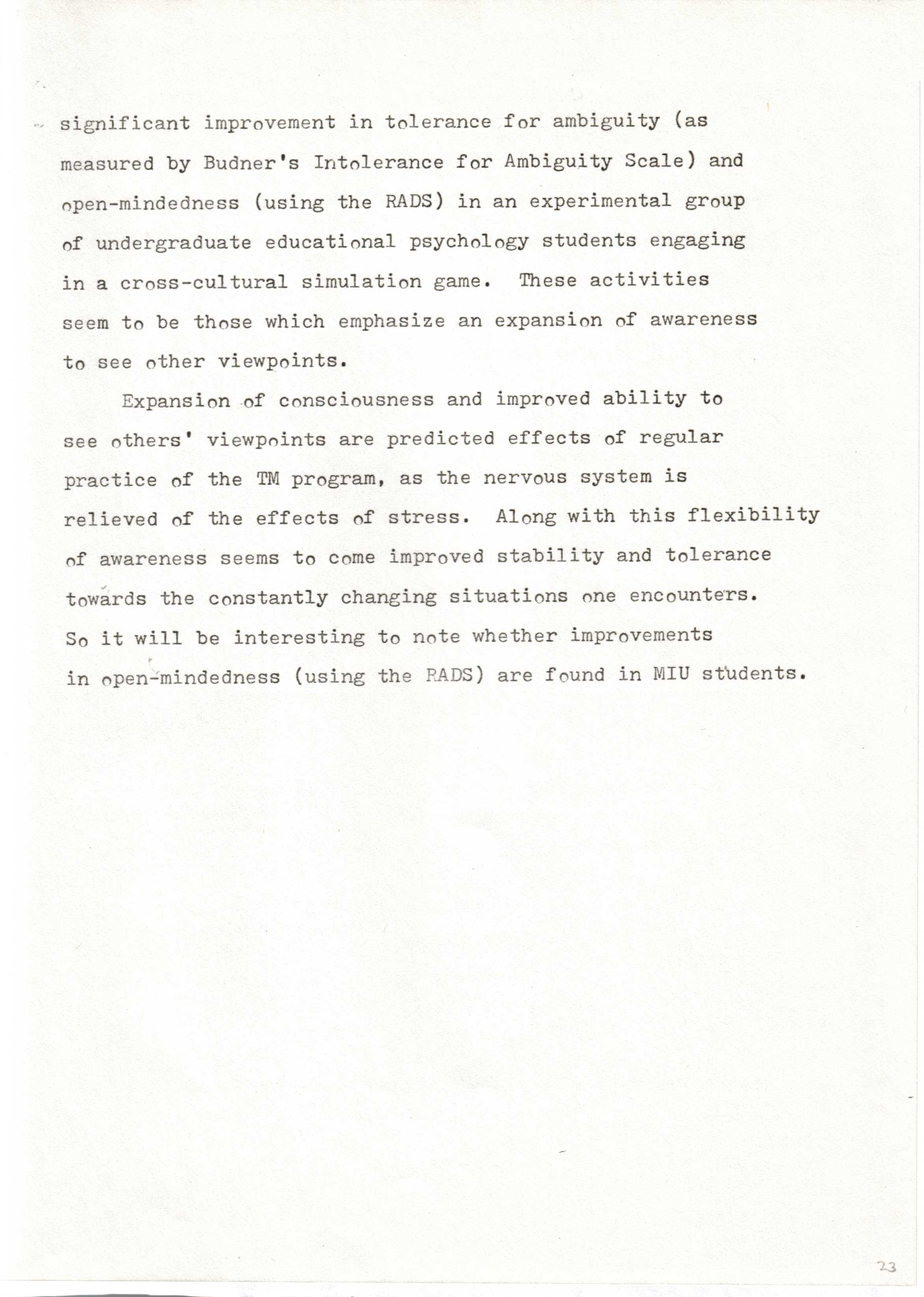
ctomeegmiu23.jpg
|
significant improvement in tolerance for
ambiguity (as
measured by Budner's Intolerance for
Ambiguity Scale) and
open-mindedness (using the RADS) in an
experimental group
of undergraduate educational psychology
students engaging
in a cross-cultural simulation game. These
activities
seem to be those which emphasize an
expansion of awareness
to see other viewpoints.
Expansion of consciousness and improved
ability to
see others' viewpoints are predicted
effects of regular
practice of the TM program, as the nervous
system is
relieved of the effects of stress. Along
with this flexibility
of awareness seems to come improved
stability and tolerance
towards the constantly changing situations
one encounters.
So it will be interesting to note whether
improvements
in open-mindedness (using the RADS) are
found in MIU students.
|
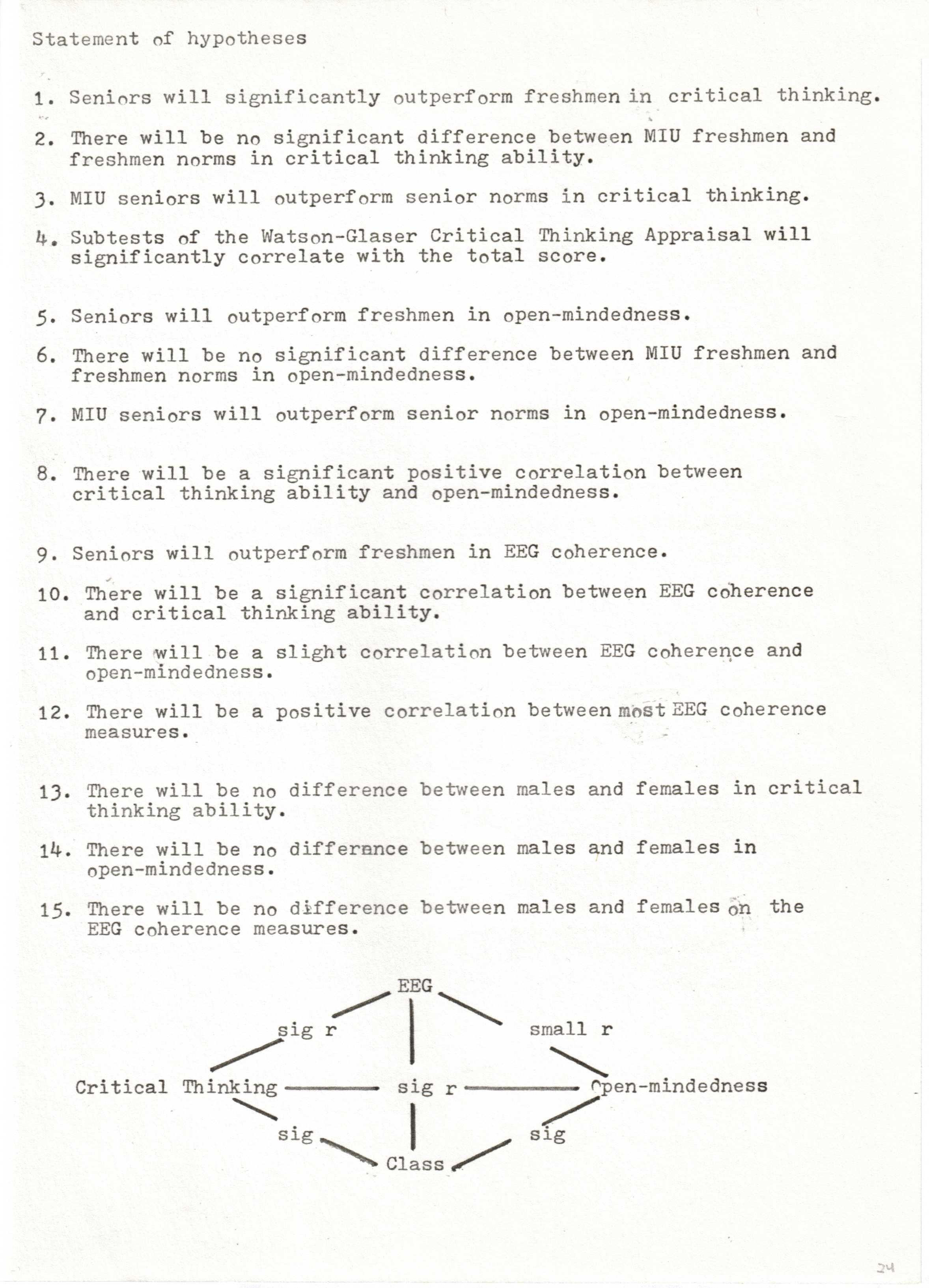
ctomeegmiu24.jpg
|
Statement of hypotheses
1. Seniors will significantly outperform freshmen in critical thinking.
2. There will be no significant difference
between MIU freshmen and
freshmen norms in critical thinking
ability.
3. MIU seniors will outperform senior norms
in critical thinking.
4. Subtests of the Watson-Glaser Critical
Thinking Appraisal will
significantly correlate with the total
score.
5. Seniors will outperform freshmen in
open·mindedness.
6. There will be no significant difference
between MIU freshmen and
freshmen norms in open-mindedness.
7. MIU seniors will outperform senior norms
in open-mindedness.
8. There will be a significant positive
correlation between
critical thinking ability and
open-mindedness.
9. Seniors will outperform freshmen in EEG
coherence.
10. There will be a significant correlation
between EEG coherence
and critical thinking ability.
11. There will be a slight correlation
between EEG coherence and
open-mindedness.
12. There will be a positive correlation
between most EEG coherence
measures.
13. There will be no difference between
males and females in critical
thinking ability.
1U. There will be no difference between
males and females in
open-mindedness.
15. There will be no difference between
males and females on the
EEG coherence measures.
 |